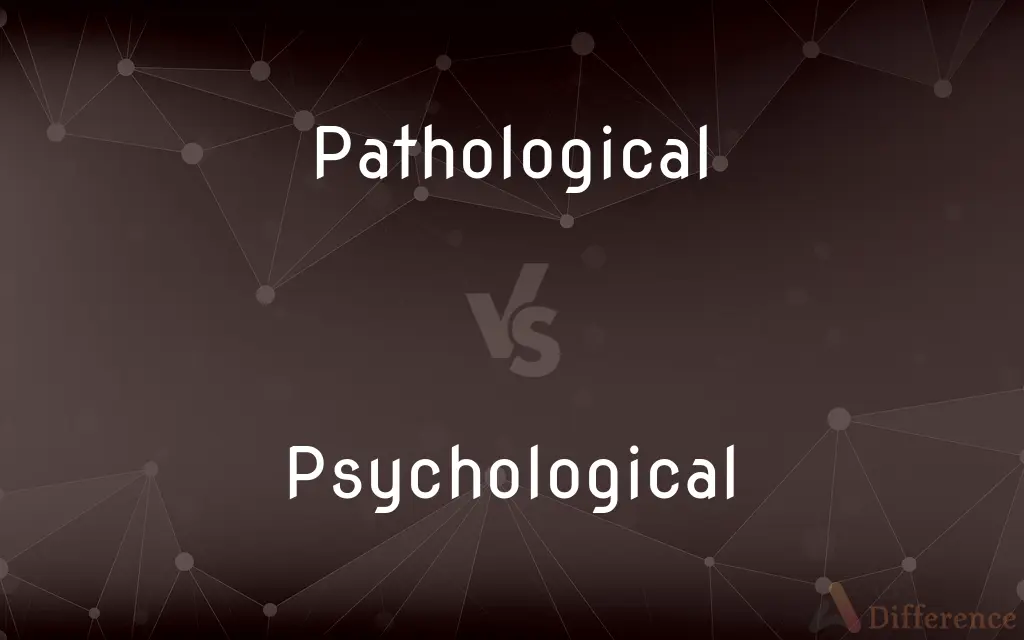Pathological vs. Psychological — What's the Difference?
By Maham Liaqat & Fiza Rafique — Updated on April 24, 2024
Pathological relates to disease processes, often implying chronic or severe conditions, while psychological pertains to the mind and mental states, affecting emotions, behavior, and thoughts.

Difference Between Pathological and Psychological
Table of Contents
ADVERTISEMENT
Key Differences
Pathological conditions are medical states associated with diseases and their effects on the body, focusing on abnormalities that can be objectively measured. Psychological, on the other hand, refers to aspects of mental and emotional states, which are subjective and influenced by individual experiences.
In medicine, a pathological state is often viewed through the lens of physical disruptions or malfunctions, such as in pathological fractures or pathological lying. Psychological aspects, whereas, deal with mental health issues like depression or anxiety, emphasizing internal mental processes and coping mechanisms.
The approach to treatment in pathological conditions typically includes medical interventions like surgery or pharmacotherapy aimed at correcting physical abnormalities. Psychological approaches, however, often utilize therapy and counseling, focusing on behavior modification and mental health support.
Understanding pathological conditions requires a focus on biological and physiological markers that are consistently observable, such as in cancer or autoimmune diseases. Psychological conditions, however, are understood through behavioral patterns and emotional responses, which can vary widely among individuals.
Comparison Chart
Focus
Physical diseases and abnormalities
Mental and emotional states
ADVERTISEMENT
Measurement
Objective tests (e.g., blood tests)
Subjective assessments (e.g., interviews)
Treatment
Medical interventions
Therapy and counseling
Examples
Pathological fracture, cancer
Depression, anxiety
Basis of Diagnosis
Biological markers
Behavioral patterns and self-reports
Compare with Definitions
Pathological
Describing conditions that are caused by a disease.
A pathological fracture occurs when a bone breaks in an area weakened by illness.
Psychological
Influencing or intended to influence the mind or emotions.
His speech had a profound psychological impact on the audience.
Pathological
Extreme, compulsive, and as if driven by a disease.
His pathological lying complicates clinical assessments.
Psychological
Derived from the mind or mental activity.
Psychological disorders affect a person's ability to function normally.
Pathological
Abnormal or caused by a medical anomaly.
Pathological changes in tissue can indicate the presence of cancer.
Psychological
Pertaining to psychology, the study of the mind and behavior.
Psychological theories help explain human behavior.
Pathological
Involving, caused by, or of the nature of a physical or mental disease.
Pathological jealousy can sometimes lead to violent behaviors.
Psychological
Involving the mental and emotional state of a person.
Psychological well-being is crucial for overall health.
Pathological
Relating to pathology, the study of disease.
Pathological research provides insights into disease mechanisms.
Psychological
Relating to the mental and emotional factors of a situation.
She provides psychological support to trauma victims.
Pathological
Of, relating to, or manifesting behavior that is habitual, maladaptive, and compulsive
A pathological liar.
Psychological
Of, affecting, or arising in the mind; related to the mental and emotional state of a person
The victim had sustained physical and psychological damage
Pathological
Of or relating to pathology.
Psychological
Of or relating to psychology
Psychological research.
Pathological
Relating to or caused by disease.
Psychological
Of, relating to, or arising from the mind or emotions.
Pathological
(medicine) Pertaining to pathology.
Psychological
Influencing or intended to influence the mind or emotions
Psychological warfare.
Pathological
(medicine) Relating to, amounting to, causing, or caused by a physical or mental disorder.
Psychological
Of or being any of certain primary colors whose mixture may be subjectively conceived as producing other colors.
Pathological
(mathematics) Having properties which are counterintuitive or difficult to handle.
Psychological
Of or pertaining to psychology.
An inkblot test is a method of psychological evaluation.
Pathological
(computer science) Having properties that cause unusually bad behaviour, especially regarding correctness or performance.
Psychological
Relating to the mind and behavior or to the mental, emotional, and behavioral characteristics pertaining to a specified person, group, or activity.
I'm concerned about their psychological well-being.
The film was a dark psychological thriller.
Pathological
Of or relating to the practice of pathology;
Pathological laboratory
Psychological
Without an objective, or reasonably logical foundation.
Prices seem to have stopped rising, having hit the psychological ceiling of just under 100 dollars.
Pathological
Caused by or evidencing a mentally disturbed condition;
A pathological liar
A pathological urge to succeed
Psychological
Mental or emotional as opposed to physical in nature;
Give psychological support
Psychological warfare
Pathological
Caused by or altered by or manifesting disease or pathology;
Diseased tonsils
A morbid growth
Pathologic tissue
Pathological bodily processes
Psychological
Of or relating to or determined by psychology;
Psychological theories
Common Curiosities
What does psychological mean?
It relates to the mental and emotional processes and well-being of a person.
Can a condition be both pathological and psychological?
Yes, some conditions, like depression, can have both physical (pathological) and mental (psychological) components.
What is an example of a pathological condition?
Cancer is a classic example of a pathological condition due to its physical and cellular nature.
What does pathological mean?
It refers to conditions and behaviors that are due to a disease or are indicative of a disease.
How are pathological and psychological evaluations different?
Pathological evaluations focus on physical disease markers, while psychological evaluations assess mental states and behaviors.
What is an example of a psychological condition?
Anxiety is primarily a psychological condition, characterized by mental and emotional symptoms.
How do pathological and psychological treatments differ?
Pathological treatments often involve medical interventions, while psychological treatments generally focus on therapy.
Is psychological focused solely on disorders?
No, it also encompasses the broader study of mental processes and behaviors.
How important is psychology in understanding human behavior?
Psychology is crucial for understanding, predicting, and modifying human behavior.
Is pathological always related to physical health?
Yes, it generally pertains to physical diseases and their effects.
What role does pathology play in medicine?
Pathology helps in diagnosing diseases and understanding their progression.
Share Your Discovery

Previous Comparison
Liqueur vs. Waldmeister
Next Comparison
Caipirinha vs. MojitoAuthor Spotlight
Written by
Maham LiaqatCo-written by
Fiza RafiqueFiza Rafique is a skilled content writer at AskDifference.com, where she meticulously refines and enhances written pieces. Drawing from her vast editorial expertise, Fiza ensures clarity, accuracy, and precision in every article. Passionate about language, she continually seeks to elevate the quality of content for readers worldwide.















































